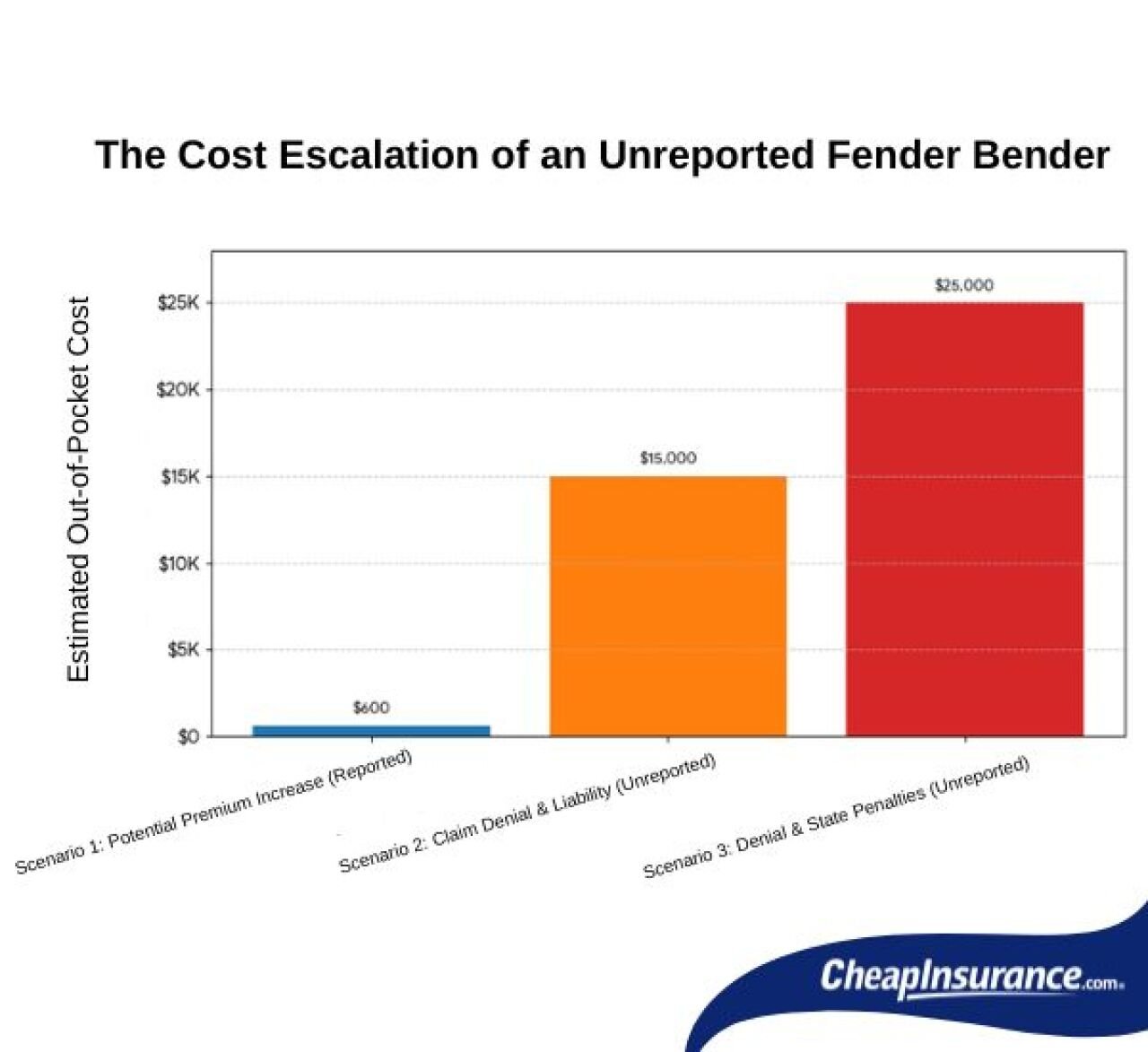A fender bender can feel like a minor inconvenience, a brief, stressful disruption quickly resolved with a handshake and an agreement to “keep the insurance companies out of it.” Drivers often make this snap decision to avoid the immediate hassle of filing a claim or the feared increase in their car insurance rates.
However, choosing to handle a car accident privately, regardless of how minor it appears at the scene, is a financially and legally dangerous gamble. That small dent or scratch, which seems resolvable with a few hundred dollars in cash, can quickly escalate into a catastrophic liability claim, denied coverage, or state-level legal penalties, including driver’s license suspension.
Ignoring an incident, even a seemingly trivial one, is an action that puts you in violation of your insurance contract and leaves you financially exposed. CheapInsurance.com breaks down the serious and often-overlooked ramifications of keeping a car accident a secret and provides the essential information you need to protect yourself from unnecessary risk.
The primary reason most drivers opt not to report a minor accident is the assumption that it will be quicker and cheaper to handle the damages privately. However, this decision immediately puts you in violation of your insurance contract and leaves you completely exposed to financial disaster.
An auto insurance policy is a contract, and nearly every policy contains a clause requiring the insured to provide “prompt notification” of any incident that could reasonably lead to a claim. By not reporting the fender bender, you breach this fundamental term.
The consequences of this breach are severe and immediate:
Beyond your personal insurer, you may have a legal obligation to report the accident to the state’s Department of Motor Vehicles (DMV) or equivalent agency. In many jurisdictions, any accident resulting in property damage over a certain threshold (often $1,000) or causing any injury, regardless of fault, must be reported to the state within a defined timeframe. Failure to comply with this specific legal requirement can lead to far greater penalties than an insurance claim, including fines, driver’s license suspension, and the mandatory filing of an SR-22 certificate of financial responsibility. SR-22 insurance is essentially a high-risk insurance filing that drastically increases your insurance rates for a period of years.

(Data compiled and estimated from analysis of national average premium increases, typical personal injury defense costs, state-mandated SR-22 insurance surcharges, and liability judgments.)
This chart compares the maximum financial impact of three scenarios:
This question is the core of the driver’s hesitation, and the answer is no, reporting an accident does not automatically raise your insurance rates. While it is true that filing a claim can lead to an increase, the relationship between reporting an incident and your premium is more nuanced and depends on several key factors:
The reality is that an insurer will eventually find out about a non-reported accident if the other driver files a claim. At that point, not only might your rates increase due to a found-at-fault claim, but you will also face the penalty of contract breach and potential claim denial. It is far better to report the incident, secure your full legal protection, and face the minimal risk of a rate adjustment, than to risk total financial ruin.
An often-overlooked financial consequence of an unreported accident relates directly to your car’s market worth, a concept known as diminished value.
In the modern used car market, a vehicle’s history is rigorously tracked through services like CarFax and AutoCheck. These services primarily rely on two sources of data: collision repair shops and insurance claims. If a fender bender is minor and is handled entirely outside of the insurance and official systems, the repair work may not generate a formal record.
However, if you and the other driver agree to a private cash settlement, and the other driver uses that money for repairs at a body shop that does report to a national database, the accident is documented on the vehicle’s history report. If you later try to sell your vehicle, a potential buyer seeing this report will notice the damage history. Since there is no corresponding police or insurance report, the damage history is vague, forcing the buyer to assume the worst.
In this scenario:
Conversely, if you report the accident and the insurance company manages the repair, a formal, detailed claim file exists. This file can be used to prove to a future buyer that the damage was professionally repaired, limited in scope, and that the appropriate financial responsibility was met, which helps to mitigate the impact of the accident on your vehicle’s eventual resale price. By failing to report, you essentially leave a vague, negative mark on your vehicle’s title history that you have no verifiable paperwork to refute.
The legal deadline for reporting an accident has two separate components, both of which are crucial: the requirement from your insurance company and the mandate from the state DMV.
1. Insurance Company Deadline: Most auto insurance policies require you to report an accident “promptly” or “as soon as reasonably practicable.” While this term is vague, in practice, it generally means within 24 to 72 hours. Sticking to this immediate timeframe is essential because it eliminates your insurer's ability to claim you violated the contract due to late reporting, thus ensuring your full coverage and legal defense are secured from the outset.
2. State/DMV Legal Deadline: State laws govern the maximum time you have to file a state required accident report with the relevant state authority (often the DMV or State Police). While these rules vary, it is a common legal requirement across many states that an accident resulting in property damage over the statutory limit (e.g., $1,000) or any injury/death must be reported to the DMV within 30 days of the incident.
Importance of the 30-Day Limit:
This story was produced by CheapInsurance.com and reviewed and distributed by Stacker.
Reader Comments(0)